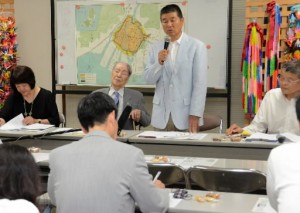Second-generation survivors’ group holds general meeting, calls for improving medical checkups
Jun. 25, 2016
by Keiichi Nagayama, Staff Writer
The second-generation survivors’ section of the Hiroshima Prefectural Confederation of A-bomb Sufferers Organizations (chaired by Sunao Tsuboi) held a general meeting in Hiroshima on June 25 and released the results of a health survey it carried out on second-generation survivors. The survey results show that one out of four respondents have concerns about their health. The group will now call on the national government to expand its coverage for health checkups.
The survey, conducted in 2014, was sent to 2,165 second-generation survivors, most of whom live in Hiroshima Prefecture, and 1,198 people in their 20s to 60s responded. Regarding their medical history, 97 people answered that they have had stomach or colorectal cancer, and five said they had developed leukemia. Among the 1,157 people who offered answers concerning their health conditions, 12.7 percent answered they have “poor health” and 12.3 percent are “currently suffering from disease,” making a total of 25.0 percent who report health issues. Of the respondents, 59.6 percent answered that they are “healthy” and 15.4 percent answered that they “have suffered from disease but are healthy now.”
To make the survey results easier to apply to studies on the health effects of the atomic bombing on second-generation survivors, the questions included where their parents were when the atomic bomb was dropped and how old they were at the time, as well as their medical history.
Ten board members attended the meeting. They decided the group’s course of action for fiscal 2016, which includes calling on the national government to add cancer screening tests to the health checkups for second-generation survivors. Also, new members of the board were elected. Masayuki Taguchi, 59, a resident of Miyoshi in northern Hiroshima Prefecture, was elected the new chairperson. Mr. Taguchi said, “The relationship between second-generation survivors and disease is not yet clear, but we will collect data on second-generation survivors in Nagasaki and will call on the national government to accept our requests.”
(Originally published on June 25, 2016)
The second-generation survivors’ section of the Hiroshima Prefectural Confederation of A-bomb Sufferers Organizations (chaired by Sunao Tsuboi) held a general meeting in Hiroshima on June 25 and released the results of a health survey it carried out on second-generation survivors. The survey results show that one out of four respondents have concerns about their health. The group will now call on the national government to expand its coverage for health checkups.
The survey, conducted in 2014, was sent to 2,165 second-generation survivors, most of whom live in Hiroshima Prefecture, and 1,198 people in their 20s to 60s responded. Regarding their medical history, 97 people answered that they have had stomach or colorectal cancer, and five said they had developed leukemia. Among the 1,157 people who offered answers concerning their health conditions, 12.7 percent answered they have “poor health” and 12.3 percent are “currently suffering from disease,” making a total of 25.0 percent who report health issues. Of the respondents, 59.6 percent answered that they are “healthy” and 15.4 percent answered that they “have suffered from disease but are healthy now.”
To make the survey results easier to apply to studies on the health effects of the atomic bombing on second-generation survivors, the questions included where their parents were when the atomic bomb was dropped and how old they were at the time, as well as their medical history.
Ten board members attended the meeting. They decided the group’s course of action for fiscal 2016, which includes calling on the national government to add cancer screening tests to the health checkups for second-generation survivors. Also, new members of the board were elected. Masayuki Taguchi, 59, a resident of Miyoshi in northern Hiroshima Prefecture, was elected the new chairperson. Mr. Taguchi said, “The relationship between second-generation survivors and disease is not yet clear, but we will collect data on second-generation survivors in Nagasaki and will call on the national government to accept our requests.”
(Originally published on June 25, 2016)








